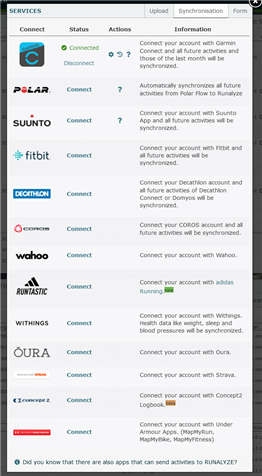Prediction of the race in Runalyze, 54:11
Garmin race forecast, 50:06
Today, my 10k run, 55:20
Prediction of the race in Runalyze, 54:11
Garmin race forecast, 50:06
Today, my 10k run, 55:20
In my case, I am referring to the average VO2max in Runalyze.
In fact, the variation of the average between races is minimal, (hundredths).
At the end of the day, the comparison is between the Runalyze average…
Are you on 12.27? This made changes to the Garmin predictions, and in my case made them more realistic
FYI, My RA is 54 vs Garmin 62, but in recent activities they are closer on same (59 vs 61 - a GC tempo effort ) and others not so ,much (54 vs 61 - a GC threshold effort) so it seems RA is…
You will not get VO2max from Runalyze. Runalyze outputs an "effective VO2max" that is not identical to the oxygen uptake that can be measured in the lab, which is called "VO2max". Nor with the value that Garmin determines and that should correspond to the laboratory value. Runalyze values are usually lower by definition.
VO2max is a scientific metric for the maximal oxygen uptake that is highly correlated with your maximal running performance, but depends on the runners efficiency. Two runners with equal VO2max values do not need to perform equal. That’s why we use the Effective |VO2max| that somehow ignores the efficiency and is equal for runners with same results for e.g. a 10k race. In addition to common calculators that estimate VO2max based on a race result, we estimate your VO2max for every activity based on the relation of your heart rate and pace.
Source: runalyze.com/.../vo2max
At the end of the day, the forecast that Runalyze delivers is closer to my performance.
You will not get VO2max from Runalyze. Runalyze outputs an "effective VO2max" that is not identical to the oxygen uptake that can be measured in the lab, which is called "VO2max". Nor with the value that Garmin determines and that should correspond to the laboratory value. Runalyze values are usually lower by definition.
Are you sure that the Garmin value should correspond to the laboratory value? I’ve heard the argument that since Garmin’s value is based on measuring performance, it should also not be properly called VO2Max but should actually be called VDOT (which is the number you get based on performance, as opposed to actually measuring oxygen uptake). For example, if you improve your running economy by working on your form, then both your Garmin and runalyze numbers should go up, but that wouldn’t change your lab VO2Max.
In other words, what is it about Garmin’s algorithm that makes it different (in principle) from the runalyze algorithm? From reading the FirstBeat whitepaper, I thought that the main unique thing about Firstbeat’s/Garmin’s algorithm was that it excludes irrelevant data.
(I’m asking in good faith here, as I would love to understand this stuff better.)
Please note that Runalyze works with Garmin data
Please note that Runalyze works with Garmin data
Yep I understand that. Not entirely sure what your point is? I think runalyze calculates its own estimated VO2Max independently of Garmin's calculations, which explains how it's possible for the (average) numbers to be different, and also for the race predictions to be different. I think they use algorithms which are similar in principle, but which obviously aren't identical.
That's why I'm questioning what the other poster said about how Garmin's VO2Max is supposed to correspond to the lab value, but Runalyze's isn't. My point was I think neither them of them correspond to literal VO2Max (oxygen uptake) measured in the lab, but both of them correspond to what some people call VDOT, which is the analogous performance-based metric.
Of course it's totally possible that I have no idea what I'm talking about, since I'm def not an expert on any of this stuff. If so, I'd genuinely like to understand how it actually works.
Also note that runalyze can sync with a whole lot of other sources besides Garmin:

My understanding is that runalyze's VO2Max estimate is based solely on heart rate vs. pace data, which can come from sources other than garmin. From reading the firstbeat whitepaper, it seems that HR and pace data also forms the basis of Garmin's algorithm as well.